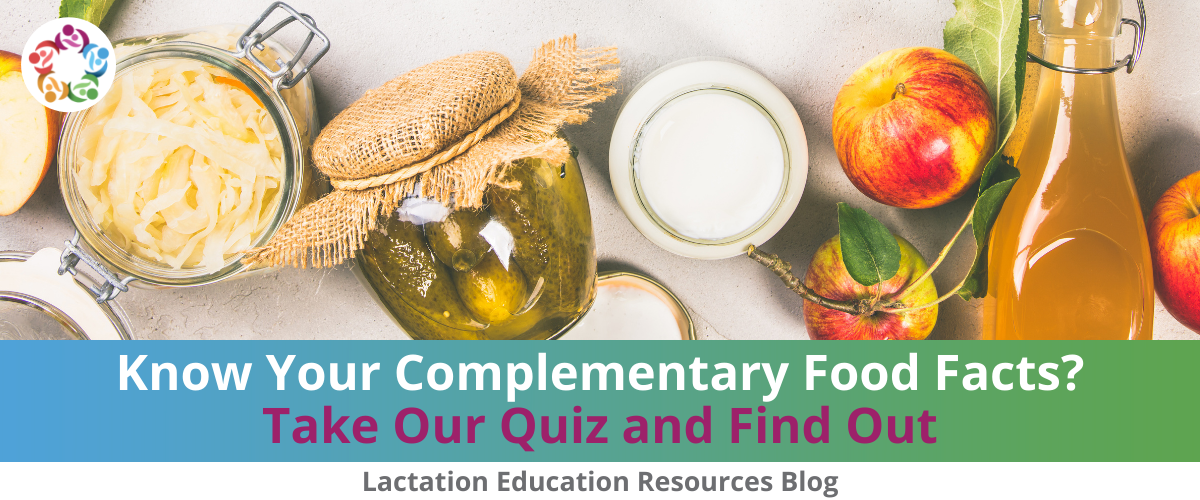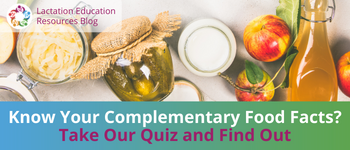Know Your Complementary Food Facts? Take Our Quiz and Find Out


Few topics are as rich with lore as what we feed our babies when they first get ready for complementary foods.
Your clients have definitely heard many of the statements below, from friends, elders, and the Internet.
Do you know which ones are based in reality?
See if you can separate fact from fiction when it comes to starting solids.
Test Your Knowledge
If you click the previous button once the quiz is complete the questions you answered correctly turn green and the incorrect answers are red.
1.) Babies should be given rice cereal as their first complementary food.
Myth - Rice cereal is fine, but there is no specific reason it needs to be universally offered as a first food. Many pediatricians in the past advised it, so parents may be getting this advice from older generations. It might be helpful to see if they need suggestions and support for responding to the elders in their life who feel strongly about this!
2.) Babies should be exposed to allergen foods at three months of age to avoid allergies later.
Myth - Food allergies are a big concern for many parents. A relatively recent scientific journal article made news when it advocated exposing some babies to foods like peanuts or eggs starting at three months. Parents may have heard about this study, but may not have understood how the research was done or whether it applies to them.
The study showed small benefits only in high-risk infants (those with a strong family history of allergies). A client whose family fits that description might benefit from a consult with an allergist. However, waiting until 4-6 months of age for exposure is usually appropriate for all babies.
3.) Babies should not have peanuts until one year.
Myth - Peanuts themselves are a choking hazard, so deferring until well past a year is often reasonable. But peanut butter or powder is fine once babies are ready for solids. If you are working with a specific baby who has a high risk of peanut allergy, it is reasonable to suggest the family consult an allergist.
4.) Babies should not have anything but milk (or formula) until they have teeth.
Myth - Some babies have teeth at birth and others still have no teeth at a year, when they would clearly benefit from complementary foods.
Counsel caregivers to use common sense, choosing foods that can safely be fed to their baby at the stage they are at, both in terms of teeth and developmental milestones like sitting and grasping.
5.) Babies should not have honey before a year.
Fact - There is a small but very real risk of exposure to botulinum toxin in honey, which can be dangerous or deadly to a small infant.
Lactating parents can have honey as long as the baby is not stealing food off their plate while they are eating it!
6.) Babies should have cereal put in their bottles first.
Myth - For the vast majority of babies, this is not advisable and is actually considered a choking hazard.
This is definitely a myth that usually comes from the past, and it should not be perpetuated.
Rare babies with medical conditions will be advised directly by a knowledgeable physician to have thickened feeds, but this should not be applied to the majority of babies.
7.) Babies over six months of age can always have a sip of water.
Fact - Caregivers of babies six months or older can offer water freely.
However, babies under six months should not be offered pure water, as their kidneys are not ready to process it.
How did you do?
These quiz questions are drawn from our new course “Human Milk for Older Infants and Toddlers."
If you are looking for more information about chest- and breastfeeding older babies and toddlers, this course has what you need.
Taught by physician IBCLC Sally Wineholt, a family medicine practitioner whose patients include many parents and older nurslings, the course also covers benefits for parent and baby, common difficulties, weaning, and more.
By accepting you will be accessing a service provided by a third-party external to https://www.lactationtraining.com/
